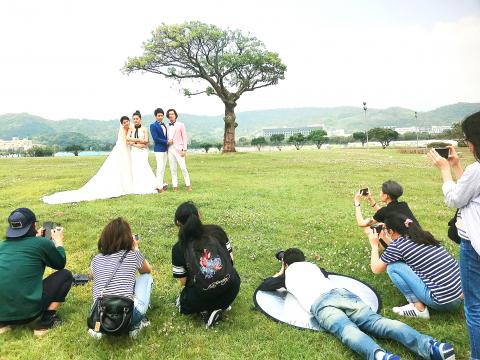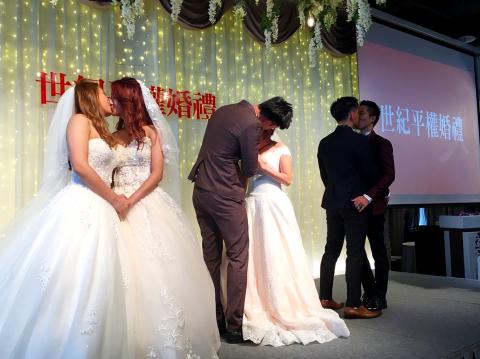When Chou Shang-hua (周尚樺) started her same-sex wedding photography service 15 years ago, many wedding businesses refused to work with her. Even when Kristin Huang (黃敏惠) married her girlfriend two years ago, she says her photographer told her his peers made fun of him for taking on a same-sex contract.
But with same-sex marriage becoming legal tomorrow, everyone wants a piece of the pie, especially because fewer people are getting married in Taiwan every year. On May 7, the Web site www.marry.com.tw listed a whopping 1,024 gay-friendly wedding businesses, many of them offering discounts for same-sex couples. Wedding photographers are even offering their services for free so they can diversify their portfolio.
Chou welcomes any kind of acceptance toward the LGBTQ community, and this gold rush that started about a year ago will provide more options for same-sex couples planning their weddings. But then she asks: “If there’s really that much business, how come I don’t know about it?”

Photo courtesy of Shangdian Photo Studio
The Taipei Times spoke to eight wedding professionals, all of whom agree that while there will be a slight bump in business, the legalization of same-sex marriage will not lead to a gay-wedding explosion that will save the industry.
There are many reasons for this. Couples may be eager to register their marriage, but planning a wedding often involves the entire family — and even family business partners and local politicians — but they’re not ready to come out of the closet yet. The same-sex marriage law was only passed last Friday, and many couples did not think about marriage until they saw the concrete results.
Also, Chou says that just because a business is LGBTQ-friendly doesn’t mean they understand the nuances or needs of working with same-sex couples.

Photo Yang Chin-chieh, Taipei Times
“I think many people are still observing, since there isn’t much existing data about which businesses really understand how to work with a same-sex couple,” Huang says. “When I planned my wedding, I was really afraid of getting a dud. Once you pay the money, you can’t get it back.”
NOT AN INDUSTRY SAVIOR
Huang and her wife Amber Wang (王妍萍), who run the popular YouTube channel BBDiary (逼逼日記), planned their wedding in early 2017, before Taiwan’s Council of Grand Justices mandated that the government legalize same-sex marriage within two years, and without their parents’ blessings. Their parents have since come around and attended their second wedding on Saturday last week.
“At that time we did not know how long it would take for same-sex marriage to become legal, so we didn’t want to want to wait anymore,” Huang says.
But Chou, who operates the same-sex exclusive Shangdian Photo Studio (尚典攝影工作室), says that many of her clients don’t plan on having a wedding because they have yet to come out to their families, or their families cannot accept their sexuality.
“I get the feeling that it’s still most meaningful for them to get married with the blessing of their families,” she says. “Without their families, it’s no different from having a group dinner with friends.”
Wedding planner Masa Lee (李木恂) says that the two gay weddings he’s officiated had to be kept secret because in both cases, the couples had yet to inform their parents about their sexuality. But he’s positive that eventually, perhaps in two or three years, there will be a boom in same-sex weddings.
Wedding photographer Sam Lin (林宥町) doesn’t think there will be an impact. Like Chou, she has been photographing same-sex weddings for more than a decade. She says there are more circumstances under which straight couples get married, such as family pressure or pregnancies.
“Same-sex couples have been planning weddings for quite a while now,” she says. “It’s not like that will dramatically increase due to legalization. That was a fight for human rights, which is a separate issue. People also forget that there’s immense societal pressure on the parents.”
Another issue is that although the LGBTQ community knew that same-sex marriage would be legalized two years ago, they had no idea what the law would look like. It wasn’t a smooth process as anti-same sex marriage groups launched a successful campaign that led to the public voting against same-sex marriage in a referendum last November that coincided with the nine-in-one elections. The community was so deflated that Chou’s clients dropped to zero.
Alex Chio (邱亮士), who will marry his boyfriend tomorrow, says that he didn’t even want to consider a wedding until the same-sex marriage law was passed Friday last week.
“Now I can take my time to think whether I want one,” he says.
SAME-SEX CONSIDERATIONS
With the hordes of wedding businesses jumping on the bandwagon, it’s hard to tell which ones are truly friendly and sympathetic to same-sex couples and which are in it purely for the money.
Chou has a friend who chose a wedding photography studio that advertised themselves as LGBTQ-friendly. But the session turned out to be quite awkward, and the resulting photographs suffered.
“Clients want to feel at ease,” she says. “During the session, the photographer’s body language and interaction is especially important for same-sex couples.”
Lin says that photographers have to consider whether the couple wants privacy or if they mind people staring at them. But uncomfortable situations may happen — once she had to stop a straight couple whom they shared a space with from snapping photos of her clients out of curiosity.
Photographer Ray Hsiao (伊藤瑞) says that the standard wedding poses also don’t necessarily apply to gay couples, and when the photographer starts pressuring them to assume traditional gender roles, then problems arise.
“We have to rethink the whole process, in order to produce photos that are as natural as possible,” he says.
Wedding planner Ivan Lee (李騏宇) says that there’s more to consider when planning a same-sex wedding, especially with managing everyone’s emotions. Perhaps someone may say something insensitive, and not all guests necessarily are used to seeing same-sex couples.
If the wedding planner has no experience dealing with these issues, or is just there for the money while harboring their own prejudices, the couple can tell right away.
“Homosexuals are usually more sensitive due to the discrimination they’ve suffered. They need a wedding planner who understands how difficult it has been for them to get to this point,” he says.
Creativity is also important. Take attire for example — straight weddings follow a standard format, no questions asked. With gay weddings, Chou says there’s more freedom about who wears a dress and who wears a suit, and they can even switch outfits halfway through the wedding. Gay couples can have matching suits but different colored ties, and so on.
Huang says that the legalization of gay marriage is a new opportunity to explore new wedding formats and other services that cater to the LGBTQ community.
“Discrimination isn’t going to suddenly disappear, but as the LGBTQ community becomes more visible, they’ll be more vocal with their needs, and there will be more business opportunities in all sectors.”

In the March 9 edition of the Taipei Times a piece by Ninon Godefroy ran with the headine “The quiet, gentle rhythm of Taiwan.” It started with the line “Taiwan is a small, humble place. There is no Eiffel Tower, no pyramids — no singular attraction that draws the world’s attention.” I laughed out loud at that. This was out of no disrespect for the author or the piece, which made some interesting analogies and good points about how both Din Tai Fung’s and Taiwan Semiconductor Manufacturing Co’s (TSMC, 台積電) meticulous attention to detail and quality are not quite up to

April 21 to April 27 Hsieh Er’s (謝娥) political fortunes were rising fast after she got out of jail and joined the Chinese Nationalist Party (KMT) in December 1945. Not only did she hold key positions in various committees, she was elected the only woman on the Taipei City Council and headed to Nanjing in 1946 as the sole Taiwanese female representative to the National Constituent Assembly. With the support of first lady Soong May-ling (宋美齡), she started the Taipei Women’s Association and Taiwan Provincial Women’s Association, where she

Chinese Nationalist Party (KMT) Chairman Eric Chu (朱立倫) hatched a bold plan to charge forward and seize the initiative when he held a protest in front of the Taipei City Prosecutors’ Office. Though risky, because illegal, its success would help tackle at least six problems facing both himself and the KMT. What he did not see coming was Taipei Mayor Chiang Wan-an (將萬安) tripping him up out of the gate. In spite of Chu being the most consequential and successful KMT chairman since the early 2010s — arguably saving the party from financial ruin and restoring its electoral viability —

It is one of the more remarkable facts of Taiwan history that it was never occupied or claimed by any of the numerous kingdoms of southern China — Han or otherwise — that lay just across the water from it. None of their brilliant ministers ever discovered that Taiwan was a “core interest” of the state whose annexation was “inevitable.” As Paul Kua notes in an excellent monograph laying out how the Portuguese gave Taiwan the name “Formosa,” the first Europeans to express an interest in occupying Taiwan were the Spanish. Tonio Andrade in his seminal work, How Taiwan Became Chinese,